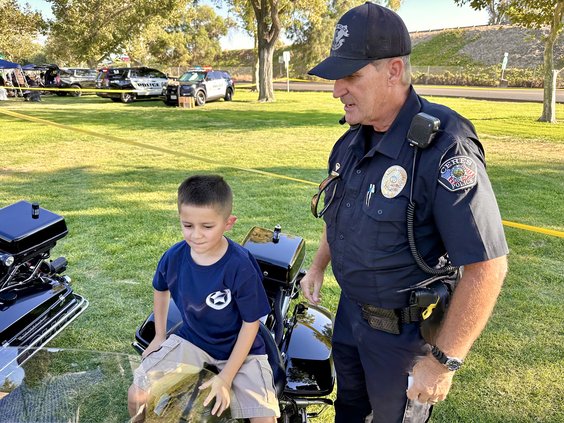Triple-digit evening heat did not deter several hundred persons from flocking to see what the annual National Night Out event in Whitmore Park had to offer Tuesday, Aug. 6.
The National Night Out celebration was designed to bring the community together and reduce local crime. Held from 5 p.m. to 8 p.m., the event featured information booths, free food, games, displays of police vehicles, raffles and a drone demonstration.
National Night Out is held annually on the first Tuesday in August in many cities to focus on community crime prevention.
The public checked out a myriad of police vehicles, including the Ceres Police SWAT armored vehicle, nicknamed “the Bear” and a traffic motorcycle.
Starbucks handed out pastries and drinks while Ivan’s Incredible Popcorn handed out freebies. Sugar Rush, a Modesto company, gave cotton candy to the public. Hope Tree Church offered face painting for the kids. Hot dogs were barbecued by members of the Ceres Lions Club and prepared by members of Ceres Youth Soccer’s youth 15 Earthquake team. Kids were also entertained by a large bounce house and slide.
Other free food was offered by Beto’ Bakery of Ceres, Mr. Taquito and El Tarasco Snacks. The local Pepsi distributors brought so many bottles of soda the public was carrying off flats of them for free.
Crime Stoppers of Stanislaus County had a booth giving out free promotional goods designed to get out the word.


The presence of Officer Brian Chandler’s police canine drew a lot of interest, especially among the children who were allowed to pet.
At around 7 p.m. the crowd enjoyed watching Ceres Police Chief Chris Perry get soaked in the dunking booth. Another event that drew interest was a demonstration of how a canine can take down a suspect – this one wearing a protective “bite” suit used in training.
Congressman John Duarte, R-Modesto, showed up to attend the Ceres event and was given an overview of the Ceres Police Department’s drone system. Duarte, who was making his rounds to other NNO events in his district, spent some time chatting on local and national issues.
At around 6 p.m. the Stanislaus County Sheriff’s Department helicopter swooped over the park, making wide circles, surprising many with its emergency siren that could be heard loud and clear from the distance of hundreds of feet overhead.
That was about the time that six-year-old Andres Ortega of Ceres was allowed to sit on a police motorcycle while his mother took photos.


One of the officers who rides a Ceres chopper is Jerry Kessler, who spent 31 years with the California Highway Patrol, came to Ceres Police in 2016 and specializes in commercial enforcement, traffic enforcement and traffic collisions.
Kessler said while motorcycles are ridden year round, they usually aren’t put on the streets when the roads are rain slickened. The policy of the department is that a motorcycle officer who engages in a pursuit usually defers to a patrol car once it arrives.
Kessler reflected on a common complaint lodged at council meetings that traffic violations are worse with time. The officer said the level vehicle code violations are about the same as it always was, “it’s just that there’s more people now.”
He said back in the 1970s, there were fewer cars because of the gas shortage but said “now you can go out and buy a Dodge Challenger or the Mustangs or Camaros and it’s easy to get just a crazy fast car.”
Typically it’s the younger drivers who receive the lion’s share of speeding tickets.
Worse than speeding as a traffic safety concern is the distracted driver, Kessler noted.
“I’ll pull up next to people at the light and they’ll be on their phone. I’ll wave and I usually have to hit the horn, which is an air horn so it’s a little loud, just to get their attention.”
He said he frequently cites drivers for cell phone use while driving, saying, “It’s almost worse than drunk driving because they don’t think it’s a big deal.”
Kessler suggested that currently fewer people want to be police officers as population increases and a new law will make it tougher to recruit. Next year the state is required all officer candidate must have earned a bachelor’s degree or obtain one within a year and a half.
“That’s going to make it a lot tougher.”
Kessler said he has an associate degree and been in law enforcement for 40 years.
“The theory is we want smart police officers. Okay, so make them have a degree. Well does that make them smarter? Does that give them common sense?”









